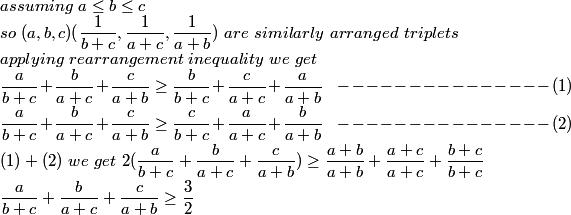posting another solution
10 Answers





Now I think,you can simplify!!
PS:That inverted question mark should be ">"
Made some typing mistakes!!!!!!!!!!!
The LHS of the above expression should be divided by 3
see,
consider 3 no's (a+b),(b+c),(c+a)
using CAUCHY SCHWARZZZZZZZZZZ INEQUILITY
(a+b)+(b+c)+(c+a)[1/(a+b)+1/(b+c)+1/(a+c))]≥32
rearranging & subtracting 3 from both s
((a+b+c)/(b+c)-1)((a+b+c)/(a+c)-1)((a+b+c/(a+b)-1))≥3/2
or
(a/(b+c))+(b/(a+c))+(c/(a+b))≥3/2
hope u got ..............
no, i rechecked my solution but din find ny mistake,
i think u r not able to understand as their is no latex,
but latex is not working........
in my case
a/b+c + b/c+a + c/a+b ≥3/2......
This is if and only if
1+ a/b+c + 1 + b/c+a + 1 + c/a+b ≥3/2+3
Which is if and only if
(b+c+a){1/b+c + 1/c+a + 1/a+b} ≥9/2......
which is if and only if
2(b+c+a){1/b+c + 1/c+a + 1/a+b} ≥9......
Which is if and only if
(b+c+c+a+a+b){1/b+c + 1/c+a + 1/a+b} ≥9
which is true because of AM-HM inequality....
Thanks everyone.........I used same method as Nishant sir........
bt mah frnd said dat it's wrong dats why I asked.;-)
it can also be done by rearrangement inequility
which i think rahul1993 will post.....
